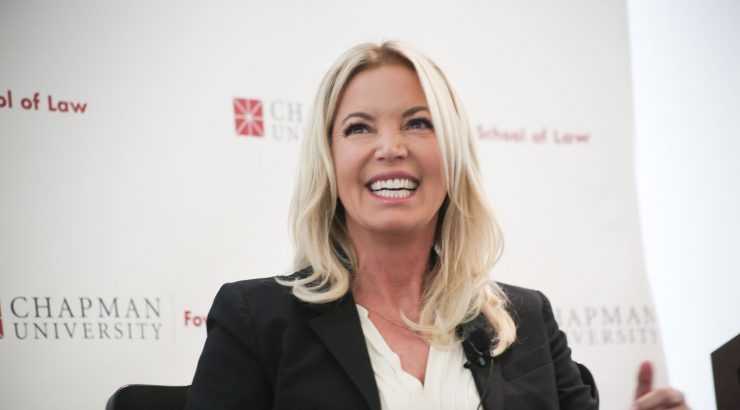
For Lakers CEO Jeanie Buss, success is equal parts passion and experience 'The most important woman in sports' visited Chapman University for a conversation about sports leadership
February 13, 2019
Throughout her decades-spanning career, Jeanie Buss has worn a lot of hats. She has been the owner of a roller hockey team (the Los Angeles Blades), the president of an arena (The Forum), and currently, the chief executive officer of one of the most successful NBA teams of all time, the Los Angeles Lakers. She was named one of the Top 20 Most Influential Women in Sports by Sporting News, “one of the most powerful women in the NBA” by ESPN, and “the most important woman in sports” by Bloomberg.
But before she could take her first job in sports—as manager of the Los Angeles Strings, the professional tennis team purchased by her late father, Dr. Jerry Buss—then-19-year-old Jeanie Buss had to make a promise to finish out the degree she’d started at the University of Southern California.
“That was a very important thing to my father, as it should be,” Buss told a packed room during a special appearance on Feb. 5 at the Dale E. Fowler School of Law as part of the Chapman Dialogue Series and George L. Argyros School of Business and Economics 20th Anniversary Distinguished Speaker Series. “Education was the No. 1 most important thing. I did it and learned a lot of good lessons.”
Buss joined Fowler School of Law Dean Matt Parlow on stage inside Kennedy Hall for an hour-long conversation about sports leadership. Among the many aspects of her varied career discussed was how Buss handled going from managing a single sports team to running a venue like the Forum—which, on any given night, might have been hosting a basketball game, boxing match, or rock concert.
“Before, I was a promoter trying to sell tickets,” Buss said of taking over as general manager and president of the Forum in 1995. “Now I was trying to attract promoters. It gave me a whole different viewpoint and valuable experience. It’s just a different side of the business that people forget about.”
When her father sold the Forum and the Lakers moved to the Staples Center in 1999, Buss was named executive vice president of business operations for the basketball team, which required her to once again flex a different set of skills. “I was overseeing all of the areas on the side that was generating revenue: ticket sales, broadcast, sponsorship,” said Buss.
Buss also had to deal with worried Lakers fans who “felt that we were going to lose our mystique by moving to a new arena” after 32 years at the Forum. However, those fears were allayed when in their first season at the Staples Center, led by Shaquille O’Neal and Kobe Bryant, the Lakers once again won the NBA championship.
“If I was giving any advice to any team moving to a new facility, it’s [to] win a championship that first year,” Buss joked, “because then everything just relaxes.”

Argyros School of Business and Economics Dean Dr. Thomas Turk, L.A. Lakers CEO Jeanie Buss, and Fowler School of Law Dean Matt Parlow.
Since taking control of the Lakers, Buss has dealt with a range of new challenges, including a string of player injuries, the retirement of Bryant, and numerous management changes. But the team, which was so important to her father (“I like to say my dad had six children, but the Lakers were his babies,” said Buss), is getting back on track.
Buss hired former Lakers star Magic Johnson as its president of basketball operations and noted sports agent Rob Pelinka (the keynote speaker at the Fowler School of Law’s 2018 Sports Law Symposium) as general manager. Several significant player signings followed, perhaps none more important or validating than that of superstar LeBron James just before the 2018-2019 season.
“I think we’re headed in a good direction,” Buss said. “We’re not done yet by any means, but we’re gaining momentum, our ratings are back up, and we have the best free agents. You can’t win every year, but you have to be part of the conversation. You have to give young talent the opportunity to be in the playoffs.”
Although running the Lakers might seem like one of the most highly visible, demanding jobs in the sports world, at the end of the day, it’s still just a family-run business to Buss. And it’s one that she feels is the best fit for her, even after all these years.
“My dad wanted us to have all these opportunities and to gravitate toward the things that we liked,” said Buss. “You’re not going to have the passion for something if it’s not something that inspires you every day. He saw that I was willing, and I wanted to commit the time, and he knew I was passionate about it.”
But passion is only part of the picture. Buss credits her success in part to the wide range of experience she’s gained in her various roles, from running minor league sports operations to finding creative ways to fill up the Forum when its resident teams were on the road or in off-season. It’s a lesson in adaptability from which she hopes others can learn.
“It’s a very competitive world out there,” said Buss. “Every skill set you can acquire is going to help you excel in the career that you choose. When you’re young and have the energy, take all the opportunities that you can—even if it’s something you don’t think you want to do, expose yourself to it so you understand how important it is.”

